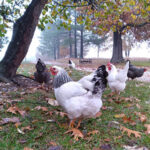
What exactly are heritage chickens? For that matter, what is a heritage turkey, duck, or goose? By definition, heritage poultry breeds share these important characteristics: They are standard breeds They mate naturally They can live a long time They are slow growing Standard Breeds Heritage breeds must have been accepted into the American Standard of […]
Continue Reading